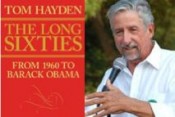Q&A: ROBERT JOHNSON, (INET)
Written on September 9th, 2014 |
Q&A: Election Reflections with Rob Johnson and Sherle Schwenninger
Written on November 13th, 2012 |
Aired 11/11/12
I will reflect on Tuesday’s election with ROB JOHNSON of the INSTITUTE FOR NEW ECONOMIC THOUGHT and SHERLE SCHWENNINGER of NEW AMERICA FOUNDATION.
Asking things like: Who does the campaign and the result say we are as a nation or a culture? Where are we likely to go from here? What does the election mean — in the broadest sense: about money, politics, power, media, culture, parties, movements, as well as in relationship to Europe, China, the Middle East, and the rest of the world?
We’ll talk about the (ideal) (evolving) (actual) role of the United States in the unfolding global story.
Q&A: TOM HAYDEN – The Long ’60s: From 1960 to Barack Obama
Written on October 31st, 2012 |
Aired 10/28/12
I haven’t done a lot about the election on this show. I’ve been talking more about the foundational issues that underlie the situation we find ourselves in — an age of very imperfect politics, government, finance, and business. Our democracy and our governance are dominated by a handful of billionaires, and a number of multimillionaires and their corporations who do not share the interests of the larger society.
But In early September I read a piece by Tom Hayden at Truthout.com. Over the next several days, it appeared all over the progressive blogosphere – Saving Obama, Saving Ourselves. I immediately contacted Tom to come on and talk about the election.
Among other things, he reminds us of the accomplishments of the first Obama administration in light of the actual political and economic circumstances he faced. He also looks at history of previous social movements. How did they interact with the political process in pursuit of their goals? And what did they gain and sacrifice in the process?
HAYDEN: “History will show that the first term was better than most progressives now think…By their nature, the achievements of social movements are lesser versions of original visions…If Obama loses, it will be unfair to blame the left, but they will be blamed nonetheless. As a consequence they will become more marginal, far less able to connect with the progressive constituencies and mass movements with vital stakes in Obama’s re-election.”
Q&A: Johnson, Eskow, Dellinger
Written on August 18th, 2011 |
Aired 08/14/11
I've invited three people to begin a conversation with me about what's broken at the intersection of our society, our politics, and our economy, how it got broken, and how we can fix it.
ROB JOHNSON served as chief economist of the US Senate Banking Committee, was a Management DIrector at Soros Fund Management, and is now Executive Director of the Institute for New Economic Thinking (INET), funded by Soros to encourage and support a rethinking of the fundamentals of economics so that they take into account the role of human behavior including politics.
R J ESKOW, a former executive and consultant on matters of finance and information technology, to AIG, the World Bank and the State Department, is a prolific blogger at the Huffington Post and Campaign for America's Future.
DREW DELLINGER is a poet, teacher, activist and founder of Planetize the Movement. He is currently finishing his doctoral dissertation on the last years of Martin Luther King Jr., and co-wrote the documentary film, The Awakening Universe.
Learn more at drewdellinger.org, for RJ Eskow -- ourfuture.org/users/new-4468 or nightlight.typepad.com/,
for Rob Johnson -- ineteconomics.org
Q&A: JANE D’ARISTA, Author – REBUILDING THE FRAMEWORK FOR FINANCIAL REGULATION
Written on April 2nd, 2009 |
Aired 03/31/09
JANE D'ARISTA writes and lectures on economics and finance and is a Research Associate at the Political Economy Research Institute at the University of Massachusetts, Amherst. She served as a staff economist for the Banking and Commerce Committees of the U.S. House of Representatives, as a principal analyst in the international division of the Congressional Budget Office and has lectured in graduate programs at Boston University School of Law, the University of Massachusetts at Amherst, the University of Utah and the New School University. Her publications include a two-volume history of U.S. monetary policy and financial regulation.
Author, REBUILDING THE FRAMEWORK FOR FINANCIAL REGULATION
"...barely known among exalted policy-makers, ...progressive economists recognize the originality of her thinking..."
-- William Greider in "Fixing the Fed" (see below)
By William Greider, March 11, 2009, Nation
http://www.thenation.com/doc/20090330/greider/print?+nofollow
Congress and the Obama administration face an excruciating dilemma. To restore the crippled financial system, they are told, they must put up still more public money--hundreds of billions more--to rescue the largest banks and investment houses from failure. Even the dimmest politicians realize that this will further inflame the public's anger. People everywhere grasp that there is something morally wrong about bailing out the malefactors who caused this catastrophe. Yet we are told we have no choice. Unless taxpayers assume the losses for the largest financial institutions by buying their rotten assets, the banking industry will not resume normal lending and, therefore, the economy cannot recover.
